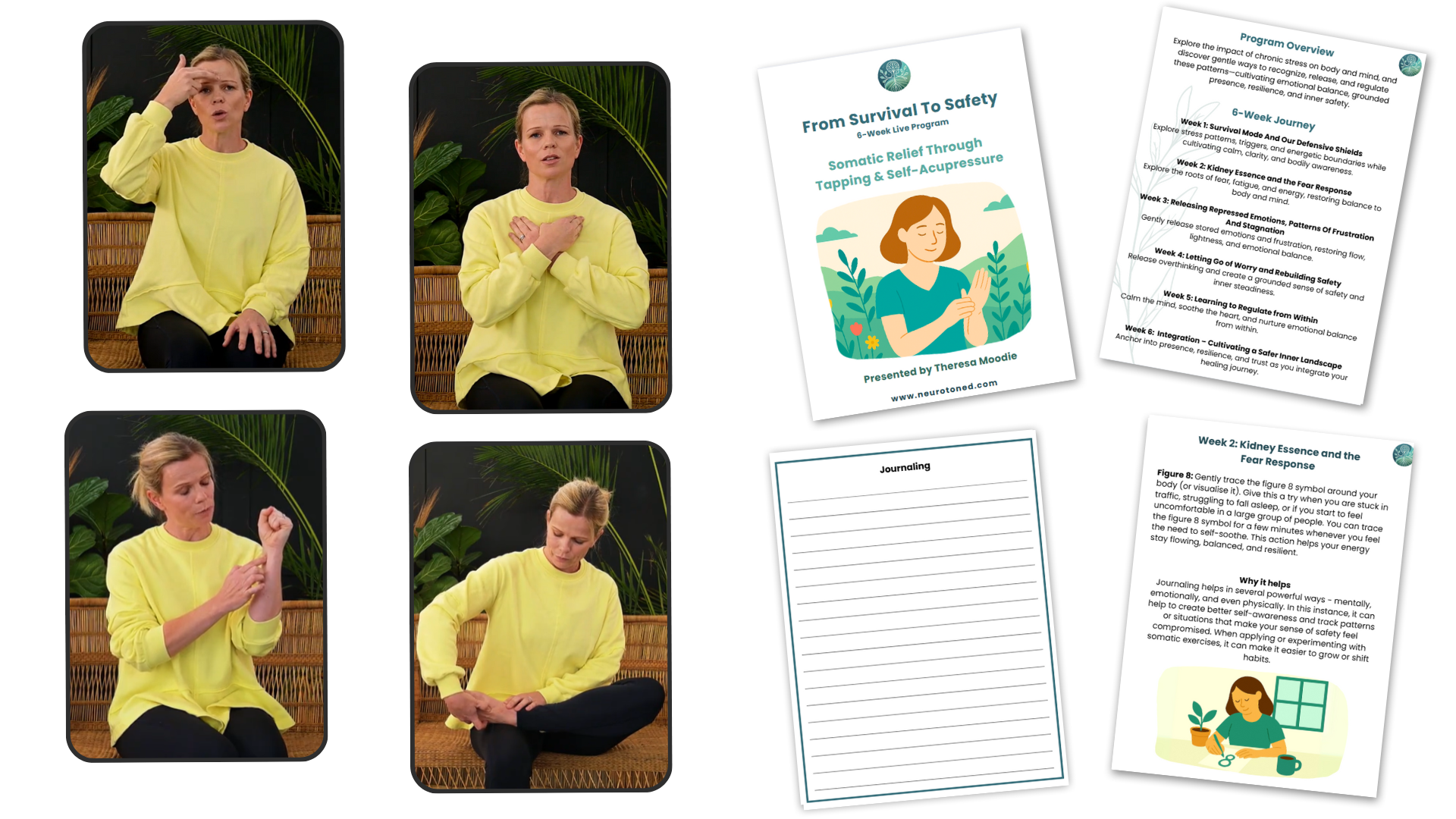
Post-Breakup Nervous System Reset for When Your Body Won’t Calm Down
Breakups can feel like your whole body is falling out from under you. The racing thoughts. The numbness. The sudden waves of panic. The exhaustion that hits out of nowhere. None of this means something is wrong with you. Your nervous system is trying to make sense of loss.
If you want to understand your body’s patterns more clearly, you can take the Stress Loop Quiz.
You deserve a steady place to land, especially right now.
A simple answer for your body right now
After a breakup, the body often reads emotional rupture as danger. Your system may tighten, speed up, or go numb. A reset isn’t about forcing calm. It’s about offering your body tiny, believable signals of safety: slow breaths, warm contact, rhythm, nourishment, and gentle routines.
Even a few seconds of softening can help.
Why Breakups Hit the Nervous System So Hard
Heartbreak blends emotional and physical pain. If your chest aches or your stomach feels tight, you’re not imagining it. Your biology is reacting. You can learn more about this overlap inside The Connection Between Psychological And Physical Pain, which explains why emotional loss often shows up physically.
Many people notice:
- jitteriness or hypervigilance
- stomach flips or “butterflies” from stress
- waves of panic
- numbness or shutdown
- trouble sleeping
- difficulty eating
If you feel “wired for no reason,” this gentle guide may help you understand the alarm response: Why do I always feel ready to jump out of my skin?
Your gut may also react strongly during emotional overwhelm. If so, this guide explains it simply: The gut-brain connection and trauma.
Your body is adapting. And it can soften.
Step One: Slow the Body’s Alarm Signals
A tiny grounding sequence
- Sit where you feel even slightly supported.
- Place one hand over your chest or sternum.
- Exhale slowly through your mouth.
- Notice one neutral sensation: your feet, a blanket, or the temperature of your hand.
If breathing makes you more anxious, you’re not alone. Many people feel this way. This guide may help: Why deep breathing makes me more anxious, and what to do instead.
If panic spikes, you can try a gentle, anywhere technique from Grounding During Panic Without Talk Therapy.
When numbness appears, see Why Your Body Goes Numb During Stress (and Gentle Somatic Ways to Reconnect). It may give language to what you’re feeling.
Step Two: Support Blood Sugar for Emotional Stability
Appetite shifts after a breakup are normal. When blood sugar dips, emotional waves can feel sharper. Small, steady meals help your system feel anchored.
You can explore gentle ideas in Butterflies in Your Stomach: Trauma or Anxiety?, especially if your stomach is tight or unsettled.
If energy crashes hit hard, Everything you need to know about blood sugar swings and the nervous system may help.
You don’t need perfect meals. Just enough nourishment to say “I’m still here.”
Step Three: Make Space for the Waves Without Drowning in Them
Heartbreak brings emotional surges. Let them move in small doses, not all at once.
Micro-allowing practice
- Notice the feeling in your body.
- Name it softly: “sadness,” “fear,” “missing,” “anger,” “confusion.”
- Stay with it for 5–10 seconds.
- Shift to something neutral: a texture, a color, a soft sound.
- Return to breath or sensation.
This rhythm mirrors How to Reset Your Nervous System After Trauma, a gentle approach many people find grounding after emotional shock.
If worry spirals or panic waves show up, this may help you understand what’s happening: What Are Panic Attacks? Why Do They Happen?
If you feel unworthy or like you “don’t have a self” anymore, this reflection may give comfort:
“I’m Not Worthy to Be Someone’s Friend Because I Don't Have a Self”
You’re not broken. You’re overwhelmed.
Step Four: Create a Simple Reset Ritual For Evenings
Evenings can feel sharp after a breakup. A gentle anchor helps your system unwind.
Evening reset
- Warm drink
- Phone placed aside
- Soft texture like a blanket
- A few slow exhales
- One sentence in a journal: “Right now, my body feels…”
If nights are particularly rough, this guide may help: How to Calm Your Nervous System Before Bed for Better Sleep.
You can also learn about the difference between dysregulation types inside
Signs Your Nervous System Is Dysregulated and What to Do.
And if you want small signals of safety to support sleep, check out this resource on how hydration can help.
Step Five: A 7-Day Post Breakup Reset Plan
Day 1: Two long exhales, three times today. One glass of water. One grounding moment.
Day 2: Eat something gentle every 3–4 hours. Don’t skip meals.
Day 3: Name your emotional waves in soft, short phrases.
Day 4: Slow walk with no pace goal. Let your body move.
Day 5: Create a soothing evening ritual. Pick one item that feels comforting.
Day 6: One hand on chest for 30 seconds with slow breathing.
Day 7: Reflect on the smallest moment your body softened this week.
Repeat for two weeks if helpful.
Common Sticking Points
“I feel numb.”
Numbness is protective. Warmth, gentle pressure, and small sensory cues help.
If you want a deeper explanation of shutdown states, Polyvagal Theory Explained Simply might help.
“I can’t stop thinking about them.”
Intrusive thoughts often signal dysregulation. Try grounding. Try rhythm.
This may help: How to Widen Your Window of Tolerance Daily.
“I wake up panicky.”
Morning stress is common after heartbreak. This guide on somatic tools for morning anxiety may help.
“I feel overwhelmed for no reason.”
This can signal a trauma response. Here’s a kind overview of Trauma-Informed Care that explains why your body reacts this way. If you want to understand your body’s patterns more clearly, you can take the Stress Loop Quiz.
FAQs
1. Why does heartbreak feel like physical pain?
Your brain processes emotional loss in similar regions as physical injury. It’s a survival adaptation.
2. How long does it take to regulate after a breakup?
It varies. Your system often begins to settle in small ways within days or weeks as safety cues repeat.
3. What if I feel nothing and “should” be crying?
Numbness can be a sign of overwhelm. Soft sensory cues may help bring you back gently.
4. Why is my sleep disrupted after a breakup?
Stress hormones rise during emotional shock. Evening rituals can help your system downshift.
5. Can grounding help with obsessive thinking?
Yes, grounding can interrupt alarm cycles by shifting your body’s focus toward safety signals.
6. Is it normal to feel both relief and grief?
Completely. The nervous system can hold mixed states during transition.
More Gentle Reads
- Gentle Nervous System Tools For Grief Waves
- How to Come Out of a Freeze Response Gently
- Feeling Your Body Again After Numbness
Disclaimer: This article is educational and not medical advice. Every nervous system is different. If you have concerns about your emotional or physical health, consider speaking with a qualified professional.
Discover Your Vagal Tone
Find out how dysregulated your nervous system is and get your personalized roadmap to feeling calm, energized, and in control


